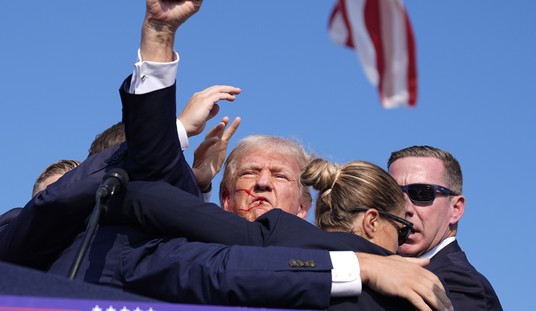The National Review’s Anne Bayefsky is worried that the administration is putting too much stock in “engagement” at the cost of relying on the words and cooperation of others to ensure national safety. “Rice’s oral and written testimony offers the most detailed defense yet of the central foreign-policy plank of the Obama administration, known as “engagement.” In short, the Obama doctrine has outfitted American interests with U.N.-made cement shoes.” In the case of the UN, the deal is American money for UN-provided security.
Rice boasted that “the U.N. helps halt the proliferation of nuclear weapons” and that “strong and sustained U.N. action makes crystal clear to governments that defy their international nuclear obligations that they will face isolation and significant consequences.” In fact, U.N. action on Iran has amounted to a two-decades-long cover-up by the International Atomic Energy Agency and its former chief, Mohamed ElBaradei, followed by years of dithering over feeble U.N. resolutions. …
On terrorism, Rice contended that “the U.N. helps isolate terrorists.” In fact, to this day the United Nations has no definition of terrorism because Arab and Islamic states believe murdering Israelis, American “occupiers,” or anyone else standing in the way of their idea of “self-determination” doesn’t count.
Well, Anne Bayefsky might be a little harsh. But it is nevertheless true that America, through NATO, is negotiating to secure its missile defense shield by providing Russia with private “door” through it. The shield is at least in part made of “engagement”. Deutsche Welle explains:
n previous years, plans developed under former US President George W. Bush for a US missile defense system based in Eastern European member states had placed international relations under considerable strain.
Though tensions have relaxed since current US President Barack Obama abandoned Bush’s plans, differences between Russia and NATO remain apparent in the preliminary discussions of a common defense shield. Russia wants to see a shared command post to ensure that the shield is not aimed at its own missiles, while NATO has opted to establish two separate systems designed to be run by their respective authorities in close cooperation.
The argument behind including Russia in the defense shield is simple. By convincing Russia it does not have to overcome the missile shield, then it won’t be incentivized to defeat the defense. Therefore the shield will be more secure for having having less threats ranged against it. But there are two problems with this idea. The first is that the Russians can already penetrate the shield at will because they can overwhelm the defense by sheer numbers any time they want. A man wearing a “stab vest” designed only to resist knives should not worry those armed with rifles firing 30-06 armor piercing bullets. They can fire through it like it was a cotton shirt. So why should the Russians even need to be assured the shield isn’t aimed against them?
Because of a second problem. How does Russia know that American technology hasn’t achieved some quantum leap that makes the missile shield far more effective than it would appear to be? In other words, how can the people armed with 30-06 AP ammunition be sure the “stab vest” isn’t really a super-duper, Area 59-inspired nanosuit? They can always feel threatened by imagining it contains a secret Element X and go about acquiring even heavier ammo against it.
For the Obama administration, one possible solution to the secret capability problem is to give the Russians access to all the technology the missile shield contains. If it contains secret Element X, then tell the Russians about it. That way, even if a 30-06 can’t penetrate it, then they know what they should buy that can. That’s what 39 Republican Senators who recently wrote a warning letter to the White House are afraid the President will do.
President Obama must beat back any Russian demands for “red-button” sway over a missile shield in Europe and deny Moscow access to sensitive data tied to the program, U.S. senators urged April 14.
The 39 lawmakers, all Republicans, said in a letter to Obama that they were “concerned” Russia would exploit his desire for bilateral cooperation on the issue to “undermine” U.S. national security.
The group, led by Sen. Mark Kirk, R-Ill., warned against giving Moscow any right to veto use of the shield or providing Russia with “access to America’s most sensitive missile defense data and technology.”
But missiles may wind up as a chip in an even bigger game. Hillary Clinton is crafting a grand bargain to create a conventional arms control regime for Europe in exchange for making Russian military deployments transparent.
Russia suspended compliance in 2007 with the Conventional Forces in Europe treaty amid rising tension with the United States. But relations have improved since President Barack Obama took over, with the two sides sealing a landmark treaty on reducing nuclear arms.
Clinton, meeting with Russian Foreign Minister Sergei Lavrov, said an agreement on conventional weapons would follow up on the goodwill seen last year in Lisbon when President Dmitry Medvedev visited a NATO summit in Lisbon.
“Nothing would advance the spirit of Lisbon like launching new negotiations to strengthen and modernise conventional arms control for the 21st century,” Clinton told Lavrov on the sidelines of NATO talks in Berlin.
“But to get there, Russia must be willing to talk to its neighbours about its equipment and forces in disputed territories,” she said, according to the prepared remarks.
“And in light of the extensive reorganisation of the Russian military over the last few years, it must be completely transparent about its military forces,” she said.
In a sense, the administration has moved away from a defense based on an asymmetry of capabilities to one based on a symmetry of intentions. As Hillary Clinton put it when she defended her policy of negotiating with the Taliban by invoking the late Richard Holbooke: “Those who found negotiations with the Taliban distasteful got a very powerful response from Richard – diplomacy would be easy if we only had to talk to our friends, and negotiating with your adversaries wasn’t a disservice to people who had died, if by talking you could prevent more violence.” The ability to make a deal is at the heart of the administration’s national security strategy. Engagement is about creating a mutually acceptable end state in which everyone lives in peace and harmony. In other words:
We are family
I got all my sisters with me
We are family
Get up ev’rybody and singEv’ryone can see we’re together
As we walk on by
(FLY!) and we fly just like birds of a feather
I won’t tell no lie
(ALL!) all of the people around us they say
Can they be that close
Just let me state for the record
We’re giving love in a family dose.
But even families can have disputes. And there is something disquieting about removing the Element X inserts in the protective vest and replacing them with written assurances from possible opponents printed on onion-skin paper. But shouldn’t we “all learn to live together”? Shouldn’t we “break the climate of fear?” Yes, but … ultimately a defense predicated on mutual assurances needs two safeguards. A robust intelligence and espionage system and a strong industrial base to rapidly rebuild if bad faith is detected. The first condition, famously known as “trust but verify” means that more one relaxes against one’s partners in “engagement”, the more one spies on them.
After all, you are basing your defense on information, so that information must be superlatively accurate and reliable. But it is unclear whether the US intelligence system, having famously failed to penetrate Saddam Hussein’s Iraq and more recently surprised by nearly every event in the Middle East, is capable of verifying to the extent necessary. If the life of the nation is based on the CIA not being surprised, it would be a bold man who would sleep easily.
But maybe a politician who knew he was going to be re-elected would sleep very easily. The second problem is that the US industrial base to rebuild no longer exists to the extend it once did, and maybe the arms treaties are being pursued precisely so that the defense industrial base can be dismantled. The payoff to engagement is a “peace dividend” even if that peace is based on a mere scrap of paper.
One of the answers to the President’s deficit problems is to cut defense so that his favorite programs can go forward. Reuters reports that the plan is that “taxes on the wealthy would rise, defense spending would fall and the U.S. budget deficit would shrink to a sustainable level by 2018 under a budget proposal outlined by the Democrats’ top budget official in the House of Representatives on Tuesday.”
Ultimately, “engagement” and “arms control” are really a clash about two things: ideology — the way that the administration and the opposition see the world; and domestic politics, how each side is prepared to spend the budget dollar. Which set of world views and budget selections is the better choice? Maybe none are; perhaps some are marginally better than others. One thing is probable: the decision will determine the security of the world for the next decade.










Join the conversation as a VIP Member